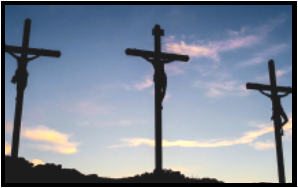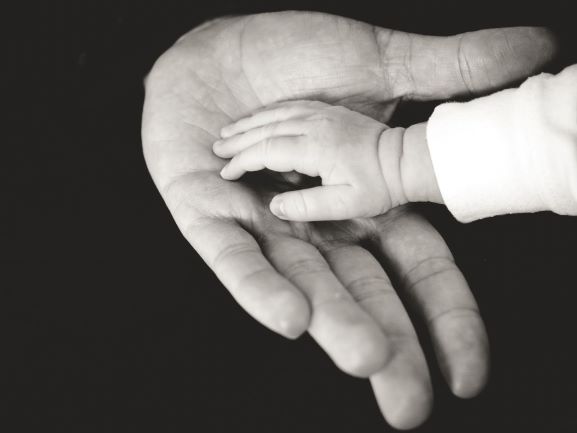Luke 24 - resurrection and revelation
 Congratulations if you have made it to the final chapter of Luke’s carefully-researched eyewitness account of “the events that have been fulfilled among us”. Like the carefully assembled pieces of a jigsaw puzzle, in the resurrection of Jesus we see the completion of the picture that the Gospel of Luke has been painting.
Congratulations if you have made it to the final chapter of Luke’s carefully-researched eyewitness account of “the events that have been fulfilled among us”. Like the carefully assembled pieces of a jigsaw puzzle, in the resurrection of Jesus we see the completion of the picture that the Gospel of Luke has been painting.
As always, Luke’s account is convincingly realistic and human – in this single chapter the disciples of Jesus are perplexed, sceptical, distracted, terrified, disbelieving, and overjoyed. But what Luke describes is also incredible and earth-shattering. Appearing at different times and places to different groups and individuals, the risen Christ explains how his death and resurrection fit into the great sweep of God’s plan of salvation, and how it gives birth to a new humanity that is free from the curse of sin and death. He opens the eyes of his disciples to recognise him, and their minds to comprehend these amazing things.
The closing verses – and the hinge into Luke’s sequel account, the Book of Acts – see the disciples worshipping Jesus, as by now they recognise Jesus to be more than just a man. Jesus is a prophet, healer, teacher and God’s chosen king, yes, but now they understand that he is also the Saviour of the World, and God come amongst us in human form.
Obedient to their risen Lord, the disciples enter a time of waiting to be “clothed with power from on high” before being sent into the world to continue the mission that Jesus began. That is the call and promise for all disciples of Jesus, who can know and experience resurrection power in their lives. But that is the story of the next book… Jonathan Mobey
Luke 23 - the crucifixion
 We get to Jesus’ crucifixion in this chapter. We read how Pilate finds no grounds to condemn Jesus, and in Matthew’s account we read of Pilate washing his hands in front of the crowd to clearly show that he wants to be innocent of Jesus’ blood.
We get to Jesus’ crucifixion in this chapter. We read how Pilate finds no grounds to condemn Jesus, and in Matthew’s account we read of Pilate washing his hands in front of the crowd to clearly show that he wants to be innocent of Jesus’ blood.
As Jesus is led away to be crucified he isn’t thinking of his own suffering, but tells the crowd to weep for themselves and their children. How often do we focus in on our own suffering and hardships? It’s so easy to do! That is the natural response. But our viewpoint and perspective is transformed if we can see things through a different lens, a different viewpoint, a Godly viewpoint. This isn’t to belittle our suffering and hardships, but it can lesson some of the pain when we view it in a different context.
And then we come to the two men hanging either side of Jesus. One hurled insults, but the other recognised the unjustness of Jesus death. They both faced the same fate, were in the same position, but saw different things, took a different response to it. Do we stand back and question why God is doing what he is doing, or do we ask for his mercy? The second man asked Jesus to remember him in the next life, and Jesus responds “I tell you the truth, today you will be with me in paradise”.
This clearly shows us the grace of God. He longs to forgive us, and it just takes a very simple prayer. Please Lord Jesus, have mercy on me, a sinner.
The death of Jesus is so terrible that darkness came over the whole land for 3 hours, in the middle of the day. The curtain was torn in the temple. It was very dramatic! The centurion watching was convinced that this was ‘a righteous man’. He was not an ordinary man, or a criminal. He didn’t deserve to die.
The temple curtain represents a new way to reach God. The curtain was there to keep people at a distance from God – but now we are able to approach God directly – we don’t need a priest who will talk to God on our behalf. We have free and direct access of our heavenly father, who longs to meet with us and free us from our old ways. Vicky Johnston
Luke 22 - Last Supper
 Have you ever had one of those days where things start so well but then get progressively worse throughout the day? You wake up looking forward to what lies ahead, but by the end of the day you wish you could go back to bed and pretend the day had never happened. I wonder if this is how the disciples felt at the last supper.
Have you ever had one of those days where things start so well but then get progressively worse throughout the day? You wake up looking forward to what lies ahead, but by the end of the day you wish you could go back to bed and pretend the day had never happened. I wonder if this is how the disciples felt at the last supper.
Luke 22 tells us of Jesus and the disciples sharing the Passover meal together, remembering how God freed the Israelites from slavery under the Egyptian Pharaohs. For Jesus’ disciples this remembering and celebrating of liberation from slavery, took a different turn. Jesus told them how his body would be broken, his blood poured out and that he would be betrayed by one of them, denied by another and (the Gospel of Mark tells us) abandoned by them all! Not the Passover meal they’d been expecting!
Where as everything looked bleak and hopeless from the disciples perspective, and their celebration had turned to sorrow, with the gift of hindsight we see how these things were part of God's salvation plan. We see how the events that followed this Passover celebration would ultimately lead to God once again setting his people free and saving them from slavery. The difference was this time it was from the slavery of sin and was for all mankind for all time. Melanie Shields
Luke 21 - keep watch
 In this chapter we see a clear outline of things to come. Natural disasters, false messiahs, wars, famine and persecution will all be experienced before Jesus returns. It paints a gloomy picture but we are not abandoned to face this future alone. Jesus assured his disciples that he would be with them with the right words and wisdom. Jesus promised that he would return in power and glory to save them and Jesus’ warnings and promises to his disciples also apply to us as we anticipate his return. Jesus does not say that believers will be exempt from physical harm or suffering. But he does say that the Holy Spirit will protect us, give us comfort and the right words to say. Ultimately, if we stand firm, believers in Jesus will be saved for eternal life.
In this chapter we see a clear outline of things to come. Natural disasters, false messiahs, wars, famine and persecution will all be experienced before Jesus returns. It paints a gloomy picture but we are not abandoned to face this future alone. Jesus assured his disciples that he would be with them with the right words and wisdom. Jesus promised that he would return in power and glory to save them and Jesus’ warnings and promises to his disciples also apply to us as we anticipate his return. Jesus does not say that believers will be exempt from physical harm or suffering. But he does say that the Holy Spirit will protect us, give us comfort and the right words to say. Ultimately, if we stand firm, believers in Jesus will be saved for eternal life.
Jesus told the disciples to keep a constant watch for his return. And although nearly 2000 years have passed, this instruction remains. We need to watch and live faithfully. Christ is coming.
Luke 20 - questions of authority
 Jesus’ entry into Jerusalem to the great joy and acclamation of the crowds had angered the ‘Powers-That-Be’. This trouble-making preacher and healer from Galilee had now arrived on their doorstep and they didn’t like it. Not only had Jesus ridden into the city in triumph but he had entered the Temple – their domain – and thrown out the dodgy dealers who had been changing the Temple money at extortionate rates and selling in God’s house. The religious authorities had been rocked by Jesus behaviour and his reputation.
Jesus’ entry into Jerusalem to the great joy and acclamation of the crowds had angered the ‘Powers-That-Be’. This trouble-making preacher and healer from Galilee had now arrived on their doorstep and they didn’t like it. Not only had Jesus ridden into the city in triumph but he had entered the Temple – their domain – and thrown out the dodgy dealers who had been changing the Temple money at extortionate rates and selling in God’s house. The religious authorities had been rocked by Jesus behaviour and his reputation.
The crowds lining the roads had named Jesus ‘Son of David’ (David was their greatest ever King and a devoted servant of God), and they’d called on Jesus to save them. The Pharisees, Scribes and Sadducees were all feeling threatened by Jesus’ presence in Jerusalem. Jesus threatened their identities, their beliefs, their roles in society and their lifestyles. And they hated him.
Their response was to try to belittle and undermine him. The whole of chapter 20 is taken up by these powerful people questioning Jesus’ own authority and trying to attack him from every angle.
In the middle of the chapter Jesus explained who he was by telling the parable of the tenants in the vineyard. This might be rather an obscure explanation to us but, in Jesus’ time and circumstances, it would have been very clear that the story was about the rebellion of God’s chosen people against God (the vineyard owner), their ignoring of the prophets who had been sent to warn them (the messengers). By extension, Jesus was claiming to be the vineyard owner’s son – and his heir. This claim outraged those in authority. The parable was also looking ahead to the fate of the son – his death at the hands of those who hated him and whose very existence he challenged.
Despite what lay ahead of him, Jesus did not shy away from debate with the powerful religious authorities. He challenged them in all their questions and their provocation to think about where their hearts lay – with God whom they claimed to serve, or with the way of the world and with the status, wealth and power that they enjoyed.
If we were to put ourselves into the events and arguments of Luke chapter 20, I think we could find ourselves challenged too. Where does our allegiance lay? With Jesus or with the way of the world which so often represents the complete opposite of the way of life Jesus calls us to live? Are we willing to challenge the ‘Powers-that-Be’ and the way of life they represent?
As we journey with Jesus to his death over the coming weeks, let’s allow that challenge to speak to us ever more deeply. Pam Rolls
Luke 19 - The King is here!
 You can hear some thoughts on the story of Zacchaeus from Jonathan’s talk during our service at Harwell on 7th April under the audio section of the website.
You can hear some thoughts on the story of Zacchaeus from Jonathan’s talk during our service at Harwell on 7th April under the audio section of the website.
The third section of the chapter captures Jesus’ triumphal entry into Jerusalem. Jesus tells his disciples to go and get a young donkey that has never been ridden before and to bring it to Jesus. What a strange request! I wonder if you’ve ever been asked to do something that didn’t really make sense to you. Why would Jesus want to ‘steal’ this donkey? It reminds me of when God asks Abraham to sacrifice his son Isaac in Genesis chapter 12. Why on earth would our creator God ask for child sacrifice? Surely that wasn’t right. We don’t always understand what we’re asked to do – but if we trust the person asking us, we’ll fulfil the request. Do we trust that God knows what he is doing when he asks us to change jobs, or move house, or persevere with a difficult situation? Sometimes we need to keep trusting that God does know what he’s doing, and that he does have a plan for each of us – even if it doesn’t seem to make sense to our human hearts.
And so Jesus enters Jerusalem on this donkey that’s never been ridden before. The donkey must know who is riding him, because otherwise the account would surely have included chaos. If you’ve ever seen a rodeo you’ll know what I mean. Horses and donkeys that aren’t used to being ridden will buck and kick and try and throw the rider off. That didn’t happen to Jesus though.
And the crowd went wild! They were praising God in loud voices. “Blessed is the king who comes in the name of the Lord!” and “Peace in heaven and glory in the highest!” It was an exciting entrance! The city was welcoming the king! Imagine the scene in Windsor on 19th May 2018 of the Royal wedding, except instead of waving flags the people were waving palm branches. In Matthew chapter 21 we read that the people were shouting ‘Hosanna’ which means ‘Save us’.
Jesus was entering Jerusalem ready to save his people from their sins. Ready to becoming the King of the Jews. Are you ready to make Jesus the Lord and king of your life? Vicky Johnston
Luke 18 - Rich and Famous?
 What to you aspire to? Who do you want to be like?
What to you aspire to? Who do you want to be like?
Many people crave fame, riches, or status. They wait to be ‘discovered’ on their YouTube channel, to strike it lucky with the Lotto, or get that top job or longed-for promotion. In this chapter of Luke’s gospel, the characteristics of those commended and held up by Jesus are strikingly different. They are the seemingly insignificant, those of low social status, the poor, and the blind.
This topsy-turvy take on the values that many of us have is a key theme for Jesus, pithily encapsulated in the subversive Beatitudes (chapter 6). If you want to be truly big, Jesus says, you must first make yourself small; if you want to be raised up, you must first humble yourself before God. It is those who know and accept their dependence on God – the giver of all good things – that will receive the very best things; those who humbly open their hands before the Lord that will have them filled.
As Jesus speaks of laying down his life in order to fulfil his mission and be raised in glory, so the followers of Jesus are to be like needy widows, repentant tax collectors, dependent children and the like, in order to receive justice, mercy, blessing, healing, and treasure in heaven. Jonathan Mobey
Luke 17 - thankfulness
 People, Christians and unbelivers alike, can be very quick to call out to God when in need. Whether it's the often repeated prayer for a sick friend or relative or a cry of "God help me!" when in dire distress. But how often do we thank God? How often do we go back to God and say thank you for the healing, helping, strength to endure?
People, Christians and unbelivers alike, can be very quick to call out to God when in need. Whether it's the often repeated prayer for a sick friend or relative or a cry of "God help me!" when in dire distress. But how often do we thank God? How often do we go back to God and say thank you for the healing, helping, strength to endure?
In Luke 17 we have the story of 10 people healed of leprosy. They were a mixed group of Jews and non Jews brought together by a terrible disease which excluded them from being a part of their families and society generally. Luke tells us they stood at a distance crying out to Jesus to have mercy on them. Jesus told the lepers to go and show themselves to the priests and as they went their leprosy disappeared.
These men would seem to have had an expectation that Jesus could heal them. They had no doubt heard of Jesus' amazing teaching and of others healed. They were also obedient when Jesus told them to go to the priests (the men would still be outcasts and "unclean" whether Jesus said they were healed or not without the priests confirmation of healing and going through purification rituals) despite the fact nothing appeared to have changed. When they realised their awful disease had gone it's not hard to imagine the joy and relief these men must have felt.
But we're told only one returns, praising God for his healing. What about the other 9?
It's easy for us to judge and condemn these men for their lack of gratitude, but in all honesty how different are we? How often do we remember to go back to God and thank him for answered prayer (especially if our prayer isn't answered in the way we hoped it would be)? How often do we thank God for the ordinary, everyday things such as our health, home, family and friends?
God wants us to go to him with our needs, worries and requests, but let's also make sure we go to him with our thanks, gratitude and praise. Melanie Shields
Luke 16 - Money matters
 What do you like about money? What it does for you? For others? For your future? Luke 16 challenges us to think about our own use of money.
What do you like about money? What it does for you? For others? For your future? Luke 16 challenges us to think about our own use of money.
Jesus does not condemn riches, only their misuse. Jesus of course does not condone the greed and dishonesty in this parable but does commend the shrewd manager in knowing how to use money to secure a future. He then applies this to his disciples – they are enlightened and so should be wise in making the right investments in securing their eternal future. For instance, we are to use our earthly resources to help people to enter heaven. If we use our money to help those in need or to help others find Christ, our earthly investment will bring eternal benefit.
Integrity is key in money matters. God calls us to be honest even in small details we could easily ignore: ‘If you are faithful in little things you will be faithful in large ones’ (Luke 16: 10). The riches of heaven are far more valuable than earthly wealth, but if we are not trustworthy with our money here (however much or little we have) ‘who will trust you with the riches of heaven?’ (Like 16:11).
Money can easily become our master, especially in this materially driven consumer world. There is always the next car, TV, bigger holiday, better house, more clothes, more gadgets, more, more, more… But we are told that we ‘cannot serve God and be enslaved to money,’ (Luke 13). No amount of money can guarantee health or happiness and certainly not eternal life. This is described vividly in 19-31. A rich man ‘lived each day in luxury’ (Luke 16:19) while a poor man lay at his gates, ill, starving and alone. When both men die, the poor man is rewarded, and the rich man punished.
Let us use our resources wisely. Sarah Barrett
Luke 15 - Lost and found
 The three parables in this chapter share the theme of ‘lost and found’.
The three parables in this chapter share the theme of ‘lost and found’.
Firstly, Jesus told the Parable of the Lost Sheep. This is a response to the criticism of the Pharisees and Teachers of the Law to his spending time with tax collectors and ‘sinners’. The religious authorities hated these people and longed to see God crush them to oblivion. Jesus on the other hand longed to see these despised people’s lives turned around and made new by God. In the same way that a diligent shepherd would move heaven and earth to find a lost sheep and bring it home safely, Jesus told his listeners that God was looking out for those who had strayed as he wanted them to be part of his Kingdom.
Jesus went on to tell the Parable of the Lost Coin. Coins could easily be mislaid in a poor home amongst the reeds that covered the floor, and the woman in the parable would have had to sweep the whole house to find the missing coin. The coin might represent a day’s wages or it could have been one of the 10 coins for which she had saved for many years and which formed the headdress that represented her marriage. These coins would have been as precious as a wedding ring. Her search until she found the lost coin gives us a picture of God’s love and care for those who are lost through no fault of their own.
Lastly, Jesus told one of his best-known parables – the Parable of the Lost (or Prodigal) Son. Actually, the story is more about the loving father who was always looking out for his wandering son to return. Even after the son’s arrogance at taking his share of the family property, and his foolishness in losing everything, his father continued to look out for him, ready to welcome him home. At the end of the parable, the father ran out to welcome his son home and he laid on a fabulous banquet to celebrate the return of his lost son.
But, oh dear, the lost son’s older brother was not happy! Like the judgemental Pharisees and teachers of the law, he wanted to see his brother condemned and ground into the dirt. His hardness of heart was just like that of the religious authorities who didn’t share the forgiving heart of the Heavenly Father they purported to represent and serve.
Whether we’ve lost our way like wandering sheep, whether we feel lost through no fault of our own, or whether we have deliberately rebelled against God, we have a loving Heavenly Father who longs for us to return to him. When we turn away from living life our own way and turn to God, through Jesus (aka the Good Shepherd) we are welcomed into God’s Kingdom and we receive eternal life. And heaven rejoices with a welcome party to beat all parties when we’re found! Pam Rolls
Luke 14 - invited to a feast
 “Well, I won’t let you come to my party then!”
“Well, I won’t let you come to my party then!”
Little children don’t have a lot of power, but the guest list for their birthday parties is something they might just be able to influence. In chapter 14 of Luke’s gospel, which starts with a meal at which Jesus is a guest, Jesus talks a lot about feasts and banquets, and who is invited.
Most of us choose to spend time with – and our resources on – our friends, who will often return the favour. Jesus, however, challenges us to open up our homes and wallets to those who will never be able to pay us back. He then goes on to explain that to be like this is to be like our heavenly Father, who invites us – waifs and strays – to his heavenly banquet, even though we have no hope of ever repaying him. It is what the Bible calls grace.
But it seems that God’s awesome grace is rejected by some. Jesus speaks of those who make excuses not to attend the once-in-a-lifetime banquet, but are instead preoccupied with the mundane things of life. Would we turn down an invitation to have tea with the Queen because it clashes with a routine dental check-up?!
We must all do some serious thinking about priorities and the costs and benefits of different courses of action. The chapter ends with some challenging alternatives with eternal consequences. Jonathan Mobey
Luke 13 - A new perspective
 Why do bad things happen to good people? In verse 4 Jesus was asked about a local tragedy that had taken place. Why do natural disasters happen? Tragic accidents? Jesus asks us to turn our thinking around – to change our questioning. The view that Jesus asks us to take, is to make sure that we are right with God. To repent and be forgiven. Do you know that peace that transcends all understanding? Philippians 4:7
Why do bad things happen to good people? In verse 4 Jesus was asked about a local tragedy that had taken place. Why do natural disasters happen? Tragic accidents? Jesus asks us to turn our thinking around – to change our questioning. The view that Jesus asks us to take, is to make sure that we are right with God. To repent and be forgiven. Do you know that peace that transcends all understanding? Philippians 4:7
Looking at the account of the crippled woman in verse 12, I wonder how long it took for the lady to get to Jesus, and how difficult that journey must have been. In Jewish temples the ladies sit upstairs in a balcony, so this lady would have needed to get up from her seat, get past others and travel down the stairs and to the front of the temple to meet with Jesus. This lady was bent over and wouldn’t have been able to move very quickly – and she could only see the floor. How wonderful it must have been when Jesus healed her – not only taking the pain away, but also giving her a completely new perspective. We read that she’d been bound for eighteen LONG years. She is healed in a moment. Her life is changed forever. Her view lifted.
How many of us long for a new view, for healing and restoration? For freedom from that which binds us. Jesus offers this freedom and a new viewpoint. Romans 10:9 says ‘If you confess with your mouth “Jesus is Lord” and believe in your heart that God raised him from the dead, you will be saved.’ Vicky Johnston
Luke 12 - hoarding? or giving?
 Luke 12 begins with Jesus teaching his disciples in the presence of “a crowd of many thousands”. It's not hard to imagine the crowd “eavesdropping” on what was being said: the hidden things will be seen; don’t fear people, fear God; you are valuable to God; stand up for your faith… But one man in the crowd had more pressing matters on his mind.
Luke 12 begins with Jesus teaching his disciples in the presence of “a crowd of many thousands”. It's not hard to imagine the crowd “eavesdropping” on what was being said: the hidden things will be seen; don’t fear people, fear God; you are valuable to God; stand up for your faith… But one man in the crowd had more pressing matters on his mind.
Luke 12:13 tells us, “Someone in the crowd said to him, ‘Teacher, tell my brother to divide the inheritance with me’.” This man didn’t want to learn from Jesus, he wanted him to tell his brother off! Jesus response is instead to warn of greed and the danger of being more concerned with earthly wealth than with your eternal soul. He tells a parable about a rich fool who hoards away his abundant crops, even having to build bigger barns to contain it all, with the plan of having an easy life, kicking back, putting his feet up, but will in fact die that night having to leave it all behind. Jesus points out in verse 21 that foolish is the person who “stores up things for themselves but is not rich toward God”.
There is nothing wrong with being successful, or with planning and saving for the future. John Wesley said, “Make all you can, save all you can, give all you can.” The problem comes when we do the make and save part, but not the give! Rather than build bigger barns why not give away the excess? Whilst doing so we also need to remember that this life is not all there is. We have life insurance to care for our families and to be prepared for what might happen to us here on earth, but do we take the same care over what will definitely happen after death? Have you got your eternal life insurance sorted? Melanie Shields
Luke 11 - prayer
 In Chapter 11 we once again find Jesus praying. When he had finished one of his disciples asked him to ‘teach us to pray.’ (11:1) Those men Jesus himself had chosen needed help in learning how to pray but Jesus did not force this learning upon them, he waited until they were ready to ask. Through the following verses Jesus focuses on content of prayer, the importance of persistence and God’s faithfulness.
In Chapter 11 we once again find Jesus praying. When he had finished one of his disciples asked him to ‘teach us to pray.’ (11:1) Those men Jesus himself had chosen needed help in learning how to pray but Jesus did not force this learning upon them, he waited until they were ready to ask. Through the following verses Jesus focuses on content of prayer, the importance of persistence and God’s faithfulness.
The order Jesus tells us is important – we must start with praising God. Our prayers can become one long shopping list but if we start by praising our amazing Lord we are put in the right frame of mind to tell him of our needs. Prayer can become a conversation not a list of requirements to be fulfilled. ‘Give us today our daily bread,’ shows that we need God’s provision daily – we cannot store it up and cut communication with God. We cannot be self-sufficient. We must recognise our needs and ask God for help. Are you feeling weakened? When did you last ask for your daily bread?
‘And forgive us our sins as we forgive those who sin against us.’ (11:4) Jesus teaches the disciples (and so us) that forgiveness is key in prayer as it is central to our relationship with God. God has forgiven our sins and we must forgive those who have wronged us. By forgiving others we show that we have understood our own need to be forgiven. Have you been wronged by someone? Have you forgiven them?
Jesus goes on to tell the disciples that persistence is important. ‘And so, I tell you, keep on asking and you will receive what you ask for. Keep on seeking, and you will find. Keep on knocking and the door will be opened to you.’ (11:9) The friend at midnight got the bread when he kept knocking. The boy will get what he asks for from his earthly father. And yet if an earthly father can give his son what he asks for, ‘how much more will your heavenly Father give the Holy Spirit to those who ask him.’ (11:13). The one who keeps knocking, keeps asking, keeps seeking, will receive. Sarah Barrett
Luke 10 - keeping focussed on the mission
 Jesus’ mission to extend the Kingdom of God was gaining ground and he commissioned a large group of followers to go ahead of him to prepare the towns and villages to receive Jesus. He sent out 72 followers in pairs and urged them to keep focussed on their mission, not to be distracted by people they met on the way, and not to be overburdened by the everyday worries of life. After all the harvest was plentiful but the workers were few, so Jesus’ followers needed to keep their eyes on the ball and follow Jesus’ commands with urgency. As his modern-day followers, we are called to do the same.
Jesus’ mission to extend the Kingdom of God was gaining ground and he commissioned a large group of followers to go ahead of him to prepare the towns and villages to receive Jesus. He sent out 72 followers in pairs and urged them to keep focussed on their mission, not to be distracted by people they met on the way, and not to be overburdened by the everyday worries of life. After all the harvest was plentiful but the workers were few, so Jesus’ followers needed to keep their eyes on the ball and follow Jesus’ commands with urgency. As his modern-day followers, we are called to do the same.
When the 72 returned to Jesus they were excited and overjoyed. They had seen the spiritual powers of evil overcome in Jesus’ name because they had remained true to Jesus’ call on their lives, they had obeyed his instructions and they had focussed on their mission. Jesus responded, full of the Holy Spirit, praising God that ‘these little children’ – these ordinary people who followed him – had understood the nature of his mission whilst the supposedly wise, such as many of the religious leaders, had missed the point.
The chapter ends with the account of Jesus’ visit to his dear friends Martha and Mary in Bethany. Martha was busy out in the kitchen preparing the meal and was resentful towards her sister Mary who was sitting at Jesus’ feet.
I’m sure many of us empathize with Martha – over busy and bustling around trying to prepare a meal for Jesus while her sister sat in the public area of the house listening intently to what Jesus had to say. There might well have been resentment in Martha’s heart over the unfair workload, but she could also have been shocked at Mary because she was behaving like a man – sitting at the teacher’s feet instead of being hidden away in the kitchen. Jesus was breaking down the barriers of convention, culture and religion. All were to be welcome to gather at his feet – men and women, the elderly and the young, people of all nations.
Jesus told Martha that Mary had chosen ‘what is better’. Of course, Jesus would have appreciated Martha’s hospitality. There needed to be a balance in the home between activity and quiet. But Mary, Martha, and we, are called to what is better. We are called to sit at Jesus’ feet listening to him and focussing our attention on him in the same way the ‘the 72’ had done. By doing so we are equipped to serve him and to serve other people with the strength and gifting he gives us through the Holy Spirit.
In between sending out the 72 and visiting Martha and Mary, Jesus told one of his best- known parables (stories which have a meaning) - the Parable of the Good Samaritan. In this parable the Samaritan, a sworn enemy of the Jewish people, had gone out of his way to help a Jewish man who’d been mugged on the road. Two other Jewish people – and religious leaders at that – had failed to help one of their own. In fact, they’d passed by on the other side of the road – maybe too busy, too distracted, too full of their own self-importance? Jesus challenged his followers to show the same kind of mercy as the Samaritan by being a neighbour to all. To whom could we be a neighbour today? Pam Rolls
Luke 9 - Is it really worth it?
 Is it really worth it?
Is it really worth it?
There is a famous experiment in which children are given a marshmallow and given the choice of eating it straightaway, or sitting alone with it for fifteen minutes (which is a very long time for a young child!), but then being given two.
The experiment – with variations – has been repeated many times, and a number of entertaining YouTube videos are available documenting how different children approach the challenge – some working hard to distract themselves, some giving in eventually, and others simply eating the marshmallow as soon as the researchers leave the room!
Many of the decisions of this life are about delaying gratification; choosing a more difficult option in the short-term, for a greater benefit in the long-term. It is this mind-set that makes it possible for athletes to train for their events, students to study for exams, and individuals the world over to make gruelling journeys for the promise of a longed-for holiday, or even of a new life.
The would-be followers of Jesus are challenged to make this sort of choice.
This term as a church we are reading through Luke’s account of Jesus’ life, and we have now reached chapter 9, with a focus on the cost of discipleship. Here Jesus sends out his hand-picked team of 12 on mission, proclaiming the kingdom of God and healing the sick. And he sends them with instructions to travel light, to accept hospitality where it is offered, and to be prepared for rejection. He later speaks of his own forthcoming rejection, betrayal and crucifixion, and how his followers are called to walk in his footsteps.
But Jesus assures them that it will be worth it; that giving up earthly privileges – and even their very lives – is as nothing compared to gaining the unimaginable riches of heaven and eternal life. Jonathan Mobey
But to live this way is hard! During an amazing experience with Jesus on a mountain, three of his disciples get swept up in the occasion and seem desperate to cling on to and prolong it for as long as possible. They want to delay their descent back down the mountain to where they know they will face the challenges and harsh realities of daily life. Many today do the same – seeking to escape into lives of fantasy or be hypnotised by the distractions of materialism.
But the followers of Jesus need to be like those children who have the maturity to wait for the greater reward. As God provided for his pilgrim people who spent a generation in the wilderness, so Jesus will provide for his followers in this life, as demonstrated in the miracle of the feeding of the 5000. And he will give us far better nutrition then marshmallows; he gives us himself, the very ‘bread of heaven’. It really is worth it! Jonathan Mobey
“Whoever wants to save their life will lose it, but whoever loses their life for me will save it. What good is it for someone to gain the whole world, and yet lose or forfeit their very self?” Luke 9:24-25
Luke 8 - where is our faith?
 We are reminded at the start of this chapter of how God loves each one of us – as unique individuals. We matter to Him – no matter what our circumstances, or what we’ve done. He knows us by name, he knows our past, and our future. He sees our deeds, even when no-one else does. There is mention of the women supporting his work financially. Matthew 6: 3-4 says ‘But when you give to the needy, do not let your left hand know what your right hand is doing, so that your giving may be in secret. Then your Father, who sees what is done in secret, will reward you.’
We are reminded at the start of this chapter of how God loves each one of us – as unique individuals. We matter to Him – no matter what our circumstances, or what we’ve done. He knows us by name, he knows our past, and our future. He sees our deeds, even when no-one else does. There is mention of the women supporting his work financially. Matthew 6: 3-4 says ‘But when you give to the needy, do not let your left hand know what your right hand is doing, so that your giving may be in secret. Then your Father, who sees what is done in secret, will reward you.’
Does our faith shine out of us brightly for all to see?
Are we strong in our faith, courageous and bold in sharing our faith? Do we fear what our friends and family will think of us if we talk about our faith, or how the bible’s teachings affect the way that we make decisions? Do we hide our faith, or forget to mention it for fear of persecution? Jesus knows us better than anyone else – and yet He loves us more than anyone else can, and promises us eternal life in heaven with Him. ‘Any present sufferings are not worth comparing with the glory that will be revealed in us’ Romans 8:18
What do we put our faith in?
Do we really believe and trust the words of Jesus recorded for us in the bible? Verse 21 is quite startling – ‘He (Jesus) replied, “My mother and brothers are those who hear God’s word and put it into practice.”’ We become children of God when we choose to accept and trust in Jesus’ words.
Do we really believe that He is in control of ALL things?
The wind, the waves, personal circumstances, our future, world leaders, death, evil?
Do we really see Jesus and who He is?
Some of us have been reading the bible for a very long time. It is easy to feel that we know who Jesus is and yet, when we ask God to reveal Himself to us, how often are we surprised by what He shows us of Himself? Do we prepare our hearts to be the good soil Jesus talks about in this chapter – or do we allow the words of Jesus be taken away from us? Have we fallen away from Jesus when times of testing came? Are we so overcome by life’s worries, riches or pleasures that we haven’t matured in our faith? Maybe you haven’t met with Jesus in a personal way before. Luke 11 tells us that when we ask, it will be given to us. Ask Jesus to reveal himself to you. You might be surprised by what you receive! Mrs Vicky Johnston
I saw a new vision of Jesus,
A view I’d not seen here before,
Beholding in glory so wondrous
With beauty I had to adore.
I stood on the shores of my weakness,
And gazed at the brink of such fear;
‘Twas then that I saw Him in newness,
Regarding Him fair and so dear.
William Vernon Higham, 1926-
Luke 7 - healing & offence
 In verses 1-17 we find the healing of the Centurion’s servant and the raising back to life of the widow’s son. In both these stories the person who needed healing wasn’t the one who asked. The Centurion’s servant was about to die, and it was the Centurion who asked for Jesus’ help, through some elders. In the case of the widow’s son no one asked Jesus for help, but he healed the son anyway, raising him to life and “gave him back to his mother” (verses 14-15).
In verses 1-17 we find the healing of the Centurion’s servant and the raising back to life of the widow’s son. In both these stories the person who needed healing wasn’t the one who asked. The Centurion’s servant was about to die, and it was the Centurion who asked for Jesus’ help, through some elders. In the case of the widow’s son no one asked Jesus for help, but he healed the son anyway, raising him to life and “gave him back to his mother” (verses 14-15).
Sometimes we might feel unable to pray (or not even think of it!), but these verses can encourage us that others can go to Jesus on our behalf, or that God moves in his mercy in our situation because he “knows what you need before you ask him” Matthew 6:8.
In verses 18-35 we read about John the Baptist in prison. John sends two of his disciples to ask Jesus, “Are you the one who is to come, or should we expect someone else?” (verse 19). As this is John who said, “Look, the Lamb of God, who takes away the sin of the world!” (John 1:29), it seems a strange for John to ask! But maybe Jesus’ response in verse 23 gives some insight, “Blessed is anyone who does not stumble on account of me,” or as some translations put it “is not offended”. Was John offended that after serving God faithfully he was left to languish in prison?
The chapter finishes with Jesus anointed by a sinful woman (verses 36-50). Here we find Simon, a Pharisee, offended by Jesus’ interaction with the woman. This passage is challenging as we too can be offended by the actions, and interactions, of others. We see someone who lives their life very differently to how we do; has a different worldview or values; who worships God in a way we can’t comprehend, and we make a judgement just as Simon does about the woman. This passage reminds us that only Jesus knows every person’s heart, past and the experiences that have brought us to the place we are. Only Jesus truly knows what we’ve been through, the life we’ve lived, and loves us anyway. Let us remember that none of us always get it right, and sometimes we get things very wrong, but if we come to Jesus truly sorry and with a repentant heart, as the sinful woman did, he is always ready to forgive us and send us on our way in peace. Mrs Melanie Shields
Luke 6 - firm foundations
 In this chapter we see Jesus challenging the Pharisees’ traditions and regulations; praying; choosing his apostles and teaching his disciples (us!) how to live.
In this chapter we see Jesus challenging the Pharisees’ traditions and regulations; praying; choosing his apostles and teaching his disciples (us!) how to live.
Before important events in Jesus’ life he takes time by himself, away from others to go and pray. He does this in Luke 6:12 where we are told he ‘prayed to God all night,’ and then called together his disciples and from them chose his twelve apostles. Do we ground our important decisions in life in prayer, as Jesus showed us?
The apostles he chose were ‘ordinary ‘ men. These men started the Christian church. Our churches today are filled with ‘ordinary’ people with a mix of backgrounds and personalities, skills and talents, just as the first twelve were. At home group this week we were talking about the number of people with different roles in our church. Some of these people and roles are visual and upfront but others are quietly completing tasks behind the scenes, perhaps unthought of or unnoticed. But together this group of ordinary people are serving others and spreading the word of God in our churches.
When Jesus healed a man on the Sabbath, questioning ‘ Does the law permit good deeds on the Sabbath, or is it a day for doing evil’ (Luke 6:9), the enemies of Jesus were ‘wild with rage’ (6:11). They were more concerned with protecting their laws than helping someone. They focussed on what should not be done rather than what should be done. In the second part of the chapter Jesus explicitly teaches us what should be done. We should love our enemies, not judge others, ‘do to others as you would like them to do to you’ (6:31). We should give our enemies the same respect and rights as we desire ourselves. He tells us that ‘What you say flows from what is in your heart,’(6:45). He reminds us that our speech and actions reveal our true underlying beliefs and motivations. And when we come to Jesus, and trust and follow his teachings, we can build our lives on foundations that will hold firm. Mrs Sarah Barrett
Luke 5 – Welcome and Healing for Outcasts
 Luke was a Greek-speaking doctor who was determined to write a well-researched, orderly and truthful account of the life of Jesus. Having not met Jesus personally in life, Luke interviewed many eye witnesses to Jesus’ life, ministry, death and resurrection, including some of Jesus’ disciples and his mother, Mary.
Luke was a Greek-speaking doctor who was determined to write a well-researched, orderly and truthful account of the life of Jesus. Having not met Jesus personally in life, Luke interviewed many eye witnesses to Jesus’ life, ministry, death and resurrection, including some of Jesus’ disciples and his mother, Mary.
Considering that Luke was a doctor, it’s not surprising that his gospel includes many accounts of miraculous healings at Jesus’ hands and some of these appear in chapter 5. Firstly, Jesus healed a man with leprosy – a disease which would have made him an outcast from society as well causing him to live with pain and infection.
Later in the chapter Jesus healed a paralysed man carried by four friends who were so determined to bring their friend to Jesus that they lowered him through the roof of the room where Jesus was teaching and laid him at Jesus’ feet. Jesus not only healed the paralysed man but he also forgave him. The religious onlookers were outraged at Jesus forgiving the man – they thought only God could forgive sins. But they hadn’t grasped, or didn’t want to grasp, who Jesus really was. The Son of God. He still is.
And it’s that same Son of God who called people to serve alongside him as apprentices, learning how to spread God’s word and grow his Kingdom. These followers weren’t smooth-talking educated types but rough fishermen, despised tax collectors and people regarded as of no consequence. Here again Jesus showed compassion for the outcast. They were the people who needed to come to faith and have their lives changed. And those followers went on to turn the world upside down, taking the good news of Jesus across the globe and beginning the early church.
There are great challenges facing us in Luke chapter 5. We are confronted with Jesus’ model of healing and caring for the sick and the outcast. Do we look at others through the eyes of Jesus? Are we passionate to see people healed and made whole as Jesus was? Are we praying for and supporting the sick or people who are outcasts in our society?
Are we willing to answer Jesus call to ‘follow me’ and willing for Jesus to change us as he did his early followers? Will we, like them, turn the world upside down for the Kingdom of God? We can do all this through the power of the Holy Spirit at work in us as individuals and as churches. May we see the Kingdom grow in 2019 and beyond. Revd Pam Rolls
Luke 1-4
 “Good news for the poor, freedom for the prisoners, recovery of sight for the blind…”
“Good news for the poor, freedom for the prisoners, recovery of sight for the blind…”
Moving from Christmas to New Year is a bit of a gear change. The focus for many changes from celebration and consumption, to commitment and control - of the waistline and finances! We often approach the New Year with a sense of resolve and mission. This is similar to the ‘gear change’ in Luke’s gospel as we move from chapter 3 to 4. Chapters 1 and 2 are all about the events surrounding the births of Jesus and John the Baptist, and Jesus’ early years, and the focus of our Advent and Christmas celebrations. Chapter 3 is a bridging chapter covering John’s ministry of preparation, and the fascinating genealogy of Jesus. Chapter 4 is an account of Jesus’ resolve and the beginning of his mission, as he faces 40 days of wilderness testing, and delivers his ‘manifesto speech’ in his hometown. Jesus initially receives a warm welcome in Nazareth, but the mood soon turns sour.
By the end of chapter 4, with energy and commitment, Jesus has launched into his itinerant ministry of exorcism, healing and preaching – doing what he said he was going to do, fulfilling a resolution he makes to do his Father’s will. Jonathan Mobey
Luke 2
 Luke 1:46-55 (NTE)
Luke 1:46-55 (NTE)
46 Mary said,
‘My soul declares that the Lord is great,
47 my spirit exults in my saviour, my God.
48 He saw his servant-girl in her humility;
from now, I’ll be blessed by all peoples to come.
49 The Powerful One, whose name is Holy,
has done great things for me, for me.
50 His mercy extends from father to son,
from mother to daughter for those who fear him.
51 Powerful things he has done with his arm:
he routed the arrogant through their own cunning.
52 Down from their thrones he hurled the rulers,
up from the earth he raised the humble.
53 The hungry he filled with the fat of the land,
but the rich he sent off with nothing to eat.
54 He has rescued his servant, Israel his child,
because he remembered his mercy of old,
55 just as he said to our long-ago ancestors –
Abraham and his descendants for ever.’